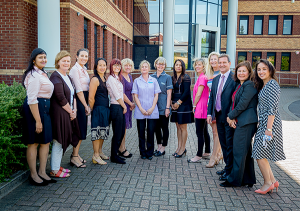
Egg Donation with The Surrey Park Clinic
Creating a family now comes in many differing ways and, since the birth of the first egg donation child in 1984, it’s an IVF option which has steadily grown to become a widely accepted and practiced treatment for female related infertility.
It’s incredibly painful and heart-breaking when couples realise that IVF isn’t going to be the answer for them and, whilst the use of donated eggs can offer hope, the choice isn’t always an easy one to make. Women are sometimes left with a sense of grief, mourning their own fertility, feeling increasingly overwhelmed and apprehensive about what the future may hold. However, as daunting as it might first appear, egg donation IVF is associated with increased rates of pregnancy success and, for some, will provide the best option of conceiving and carrying a child to birth.
Egg donation is typically suggested when IVF has repeatedly failed and although it’s understood that maternal age does impact the quality of eggs, external factors are also known play a role too. Genetics, environmental factors and medical conditions, including treatment for cancer, can all have a negative impact on a female’s fertility.
Despite the fact that egg donation IVF is a globally accepted procedure, proven to help many women conceive, the NHS currently offers no funding for this type of treatment. With couples forced to self-fund private medical care they can, unfairly, be left alone to research the increasingly confusing and complicated world of treatment protocols, additional options and fertility clinic data. It’s therefore only right that patients are under the responsibility of a sensitive clinic, who have their whole wellbeing at its core.
Alongside the wide range of fertility treatments available, Surrey Park Clinic offers an egg donation IVF service for patients embarking upon this route. Working in close partnership with Institute Bernabeu, in Spain’s Alicante, patients are fully supported by two clinics, receiving personalised and professional care throughout the process.
In April 2005 it became a legal requirement, in the UK, for all egg, sperm and embryo donors to become identifiable. From the age of 18, donor conceived children are entitled to access all identifying information about the person who donated. This, understandably, can make finding a donor in the UK a difficult task and patients can be left waiting, without a large amount of choice.

One of the reasons Surrey Park works in tandem with a Spanish clinic is due to the extensive donor databases across Spain. Spanish law requires complete anonymity of anyone who donates and, because of this, they have more readily available donors, when compared to the UK. This means there is typically no waiting time to find a donor and, once the paperwork and pre-treatment investigations have been completed, patients can usually proceed with their treatment immediately. The cost of egg donation IVF, in Spain, is also more favourable, when once again compared to the UK.
Spanish donors are fully screened and are young, healthy women, legally required to be under 35 years of age. Donations must also be altruistic. Spain was the first country, within Europe, to create definitive laws surrounding egg donation treatment and, since then, has become the most popular European destination for those seeking IVF with donated eggs. Donors are matched with recipients on ethnicity, blood type and phenotypes; hair and eye colour and body type, and medical teams are legally required to guarantee the greatest possible match on appearance and blood group, with the recipient.
For patients undergoing IVF with donated eggs at Surrey Park Clinic, one to one support is available during every stage, with consultants and nurses always on hand to answer any of the questions which inevitably arise. A fertility nurse will also help couples to fill in the necessary paperwork and join Skype calls, with the medical team in Spain, to truly strengthen the bond between the three parties involved.

Institute Bernabeu has a wonderfully supportive International team who all speak excellent English and assist with organising transfers and accommodation in Spain. Undergoing any IVF procedure is an anxious experience and both clinics believe that the logistical side, of the treatment, should be as worry-free as possible for all patients.
Recipient preparation takes place at Surrey Park Clinic and is consultant-led. Patients are partnered with a named consultant, who they work together with, in close proximity, throughout their journey. Whilst the procedure might take place in another country, consultants are still fully accessible throughout the complete treatment. All transfers are fresh, and synchronised with the donor, unless a medical reason prevents this, and mock transfers are always conducted by the medical team in Spain.
It’s perfectly natural to have doubts surrounding egg donation, either in the UK or overseas, and couples need to feel fully comfortable with their decision. Surrey Park Clinic provides the required implications counselling alongside additional, ongoing support, from their in-house counsellor.
Every person is unique and it’s the responsibility of fertility clinics to ensure that everyone is treated as an individual. Not all patients are the same and neither are the protocols used in assisted reproduction. Surrey Park clinic provides a sensitive and compassionate environment, understanding not only the intricacies of the IVF procedure, but also the importance of a tailormade service, which caters to every patient’s specific needs.
The people who walk through the doors at Surrey Park Clinic, are real people with hopes and dreams of becoming parents. No one asks to live with infertility and, when help is required, patients deserve kindness, as well as a professional and individualised treatment options.
For more information or to book your appointment please contact us
Error: Contact form not found.
[fblike layout=”standard” action=”like” share=”true”]
[tweet size=”standard” via=”” count=”true” count_type=”horizontal”]
[gplus size=”medium” style=”inline”]





 traightforward discovering that assisted conception is required, in order to have a family. The information available can be overwhelming and daunting and, at times, it’s difficult to even know where to begin. Infertility most certainly has a language of its own. There’s also an element of hopelessness and despair, when realising that future dreams are dependent on doctors, nurses and medical science, coupled together with a big pinch of luck.
traightforward discovering that assisted conception is required, in order to have a family. The information available can be overwhelming and daunting and, at times, it’s difficult to even know where to begin. Infertility most certainly has a language of its own. There’s also an element of hopelessness and despair, when realising that future dreams are dependent on doctors, nurses and medical science, coupled together with a big pinch of luck.
